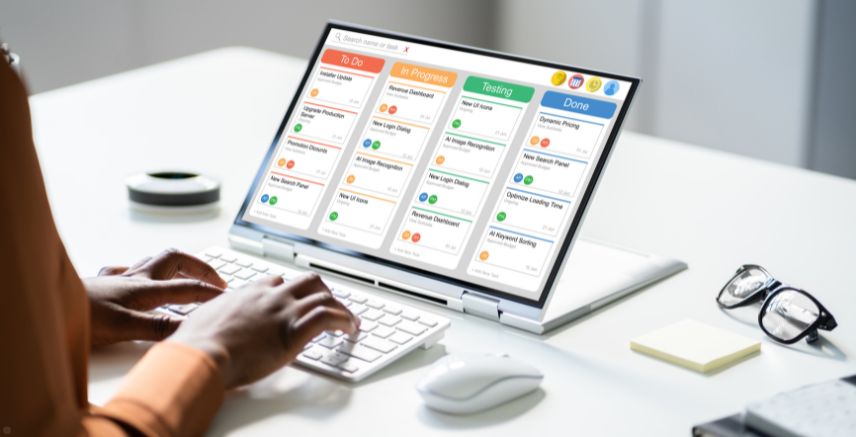Pick the Right Tool to Keep Projects on Track
As teams grow and projects become more complex, the right task management software will help keep tasks organized, deadlines on track and team members aligned. This article explores five task management software solutions for workplace efficiency in 2025.
1. ClickUp: Versatile Solution for Teams of All Sizes
ClickUp has gained popularity as a comprehensive task management platform suitable for various team sizes and industries.
Pros
- Highly customizable with multiple view options.
- Robust AI-powered features for task management.
- Extensive integration capabilities.
- Competitive pricing with a free tier available.
Cons
- Feature-rich interface may be overwhelming for new users.
- Some users report a learning curve.
ClickUp stands out for its flexibility and wide range of features. The platform offers multiple views including lists, boards, calendars and Gantt charts, accommodating different project management styles. Its AI-assisted task prioritization and workflow optimization tools help teams streamline their processes effectively.
The software's customization options allow teams to tailor the platform to their specific needs, while its vast integration library ensures compatibility with many popular tools. Whether managing simple to-do lists or complex projects, ClickUp's scalability makes it a strong contender for businesses of all sizes.
2. Asana: Ideal for Remote Team Collaboration
Asana has built a reputation for facilitating seamless collaboration among distributed teams with its intuitive interface and robust features.
Pros
- User-friendly interface.
- Strong collaboration tools for remote teams.
- Powerful automation capabilities.
- Comprehensive free plan.
Cons
- Advanced features may require a paid subscription.
- Can become costly for larger teams.
Asana excels in promoting efficient teamwork, especially for remote teams. The platform's integrated communication tools, such as built-in chat functions and contextual comment systems, help minimize unnecessary email exchanges and virtual gatherings.
The platform's Workflow Builder is a standout feature, offering a no-code solution for creating automated processes. This can significantly reduce time spent on repetitive tasks. Asana also provides various project views, including Kanban boards and timelines, catering to different work styles within a team.
3. Jira: Specialized Tool for IT and Software Development
Developed by Atlassian, Jira is tailored for IT professionals and software development teams managing complex projects.
Pros
- Robust features for Agile project management.
- Highly customizable workflows.
- Strong integration with other Atlassian products.
- Powerful reporting and analytics tools.
Cons
- Steeper learning curve for non-technical users.
- May be overly complex for simple projects.
Jira is particularly well-suited for teams using Agile methodologies like Scrum and Kanban. Its features include customizable Scrum boards, sprint planning tools and backlog management, making it an excellent choice for software development teams.
The platform also offers advanced capabilities such as issue tracking, bug tracking and custom workflows that cater specifically to IT professionals. While Jira's complexity might be challenging for newcomers, experienced users appreciate its depth and flexibility in managing intricate projects.
4. Monday.com: Visual Approach to Project Management
Monday.com offers an visually appealing and intuitive platform that's particularly well-suited for marketing teams and Project Management Offices (PMOs).
Pros
- Highly visual and customizable interface.
- Excellent for tracking marketing campaigns.
- Robust automation features.
- Wide range of integrations.
Cons
- Pricing can increase significantly for larger teams.
- Initial setup process may be overwhelming for some users.
Monday.com's strength lies in its visual approach to project management. The platform's colorful, customizable boards make it easy to track project status at a glance. For marketing teams, features like campaign tracking and content calendars prove especially valuable.
The software's Work OS concept allows teams to create custom workflows without coding, which is particularly useful for PMOs managing diverse projects. With numerous templates and integrations available, Monday.com offers flexibility while maintaining ease of use.
5. Trello: Streamlined Solution for Small Teams
Trello's simplicity and effectiveness make it an excellent choice for small teams or those new to project management software.
Pros
- Intuitive Kanban-style interface.
- Easy to learn and use.
- Flexible for various use cases.
- Generous free plan.
Cons
- Limited features compared to more comprehensive solutions.
- May become unwieldy for large, complex projects.
Trello's card-based system is ideal for visualizing workflow and managing tasks in a straightforward manner. Its drag-and-drop functionality and simple board structure make it accessible even to those with no prior experience in project management tools.
While Trello may lack some of the advanced features of its competitors, its simplicity is its strength. The platform's "Power-Ups" allow teams to add functionality as needed, and its Butler automation tool helps streamline repetitive tasks. For small teams seeking an uncomplicated yet effective job management solution, Trello is a strong contender.
Key Takeaways
Choosing the right task management software can significantly impact your team's productivity and overall business success. Whether you're a small business owner, a project manager in a large corporation or an independent professional, there's a solution tailored to your needs.
When selecting a platform, consider factors such as team size, project complexity, budget and specific industry requirements. Many of these solutions offer free trials, so don't hesitate to test drive a few before making a decision. Remember, the best job management software is one that not only meets your current needs but can also scale with your business as it grows.

